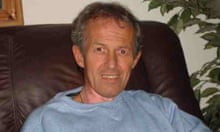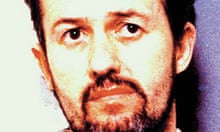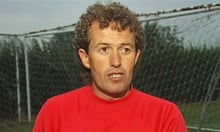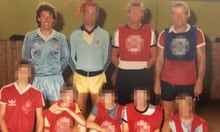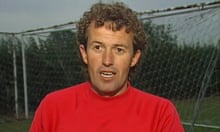It isn’t easy sitting opposite Andy Woodward and hearing, close up, the unspeakable horrors of his childhood and the reasons why, at the age of 43, he finally feels able to tell his story and free himself from the secret – “the massive, horrible burden” – that has shaped his life.
It has been there since the age of 11 when a football-daft kid from a family of Manchester United supporters first came to the attention of the coach, scout and serial paedophile Barry Bennell and it is difficult even to contemplate how much Woodward has suffered before reaching this point where he has offered to waive his anonymity and speak publicly about it for the first time.
He is doing so in the belief there are many others – potentially hundreds, he says – who are living with their own secrets, given Bennell’s employment at Crewe Alexandra in the 1980s and 1990s and close association in the past with Stoke City and Manchester City, as well as junior teams in Derbyshire, Staffordshire, Cheshire and Greater Manchester.
Bennell was sentenced to nine years in prison in 1998 after admitting 23 specimen charges of sexual offences against six boys aged nine to 15. Woodward was among the victims at Crewe and knows of other former pros who were targeted. Many more, he suspects, never made it as professional footballers, whereas his own career, also featuring spells at Bury, Sheffield United and Scunthorpe United, ended at the age of 29 because he was unable to cope with the horrendous aftereffects of what he had to endure.
Woodward had to fake an injury during one game because he was having the kind of panic attack that became a regular feature in his career. He has been suicidal “on probably 10 occasions”. He has spent his professional life battling depression and anxiety, and is haunted by what a man who described himself in legal proceedings as a “monster” told him about some of the other victims.
“My life has been ruined until the age of 43,” Woodward says. “But how many others are there? I’m talking about hundreds of children who Barry Bennell cherry-picked for various football teams and who now, as adults, might still be living with that awful fear.
“We’ve seen with the Jimmy Savile case how people have had the courage, yet I’d say within the football world it’s even harder to speak out. Only now, at the age of 43, I feel I can actually live without that secret and that massive, horrible burden. I want to get it out and give other people an opportunity to do the same. I want to give people strength. I survived it. I lost my career, which was a massive thing for me, but I’m still here. I came through the other side. Other people can have that strength.”
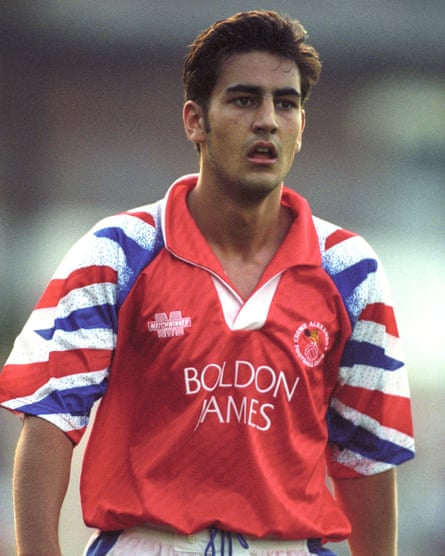
Woodward’s ordeal began when he was playing for Stockport Boys and Bennell invited him to train with one of his teams on Manchester City’s pitches at Platt Lane. Bennell talent-spotted boys, aged nine to 14, around the north-west and Midlands over three decades and Woodward was talented enough to be directed towards Crewe’s youth setup. “I just wanted to play football. My mum and dad will say that I always had a football in my hands, wherever I went. I saw Crewe as the start of that dream. But I was soft-natured, too, and it was the softer, weaker boys Bennell targeted.”
Bennell arranged for him to stay at his house on the edge of the Peak District. “It was like a treasure trove, a child’s dream,” Woodward says. “When you walked through the door there were three fruit machines. He had a pool table. There was a little monkey upstairs in a cage who would sit on your shoulder. He had two pyrenean mountain dogs. He even kept a wild cat. It was my dream, remember, to be a footballer and it was like he was dropping little sweets towards me: ‘You can stay with me and this is what I can do for you.’ Plus he had a reputation as the best youth coach in the country. So I’d stay at weekends and summer holidays and even take time out of school sometimes. I’d go to all the Crewe matches with him. He liked dark-haired boys. I was a kid, I trusted him to begin with.”
When the abuse started, Bennell used threats and blackmail to make sure his victims did not go against him. “What he’d do sometimes, to show the fear factor and make sure I never told anyone, was get out some nunchucks,” Woodward says. “He was a master with them. He’d tell me to hold out a piece of paper. I’d be physically shaking. Then he’d hit it with enough force to split it in half and make a little comment: ‘You see what I can do, you see how powerful I am?’
“It was either threats of violence or he’d use football to manipulate control. If I upset him in any way, he’d drop me from the team. ‘At any point,’ he’d tell me, ‘you will go, you will disappear and that dream won’t happen.’ It was emotional blackmail, all the time.”
The young Woodward became “very introverted, I didn’t lead a normal teenage life”. Yet there are other parts of this story that make it even more chilling. When Woodward was 14, Bennell started having a relationship with his victim’s 16-year-old sister. “He was so much older he didn’t want people to know at first and told me I would never play football again if I breathed a word of it,” Woodward says. “I was frightened to death because he had complete power over me by that stage. It was like a double whammy and he would try to abuse me sometimes even with my sister in the same house. Later, when their relationship became public, he would come round for Sunday dinner every weekend, sitting with my mum and dad and my family, laughing and joking. I was so frightened of him I just had to suffer in silence.”
The wedding took place in 1991 and Woodward, at 18, had to go through the hellish ordeal of seeing the man who had exploited, controlled and abused him for years become his brother‑in‑law. “I had to live with that on top of everything else,” he says. “I had to attend that wedding, standing in the church when I really wanted to rip his throat out. It was torture – that’s the only word to describe it.”
Despite everything, Woodward progressed through the ranks at Crewe and made his first-team debut a year later. Mentally, however, he could not cope. “From the age of 11 I had lived with a secret. And living with a secret is probably one of the hardest things you can ever live with. If you look at my career you will see I was plagued with quite a few injuries. A lot of those injuries were actually mental injuries.
“I had desperately wanted to be a footballer. It’s all I lived for. Yet there was so much anger and hurt within me that it was actually football, this game I loved, that took away my life as a child. It felt like I was in two worlds. I’d be training when I just wanted to burst into tears. A coach might be screaming and shouting and all I wanted to do is punch him in the face because ‘you’ve no idea what you coaches have done to me’. There have been lots of dips.”
He signed for Bury in 1995 and after a productive first season at Gigg Lane everything started to unravel again. “At one point during the police investigation I went to see [the manager] Stan Ternent in his office and explained what had happened to me. It was hard because us footballers are supposed to be butch and strong, aren’t we? It’s all banter and changing-room jokes, supposedly. But I’d been having a mental breakdown. I’d lost a couple of years and I felt I had to tell him.”
One of Bennell’s victims had reported him and the Cheshire, Derbyshire and North Wales police forces began an investigation that also involved allegations of him preying on boys on football courses in Spain and the United States, as well as at the Butlin’s in Pwllheli. The judge talked of Bennell exploiting the power he had to “point young boys in the right direction and help them with their careers and wishes to become successful footballers. They were prepared to do almost anything you asked.”
The hearing at Chester crown court was told one of Bennell’s offences took place on one of Crewe’s training pitches. Another occurred at the home of Dario Gradi, the club’s manager, though the court heard Gradi did not know about it. One of Bennell’s tricks was to encourage boys to stay in his bedroom by frightening them with horror films or ghost stories. He was initially charged with 45 offences, including buggery and attempted buggery, but 22 were allowed to lie on file.
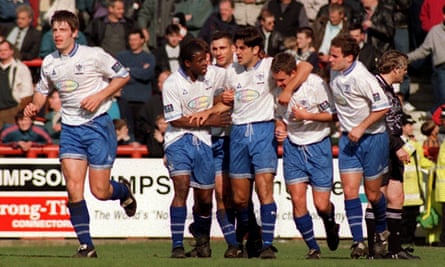
Woodward was 24 when Bennell was jailed. “For the next two seasons I played some of the best football of my career. Maybe I felt I had got it off my chest and I could finally get on with my life. I was kidding myself but for a while I had loads of positive energy. Neil Warnock had taken over as manager and in November 1999 he told me he was going to Sheffield United. ‘I’m going to take you and [the goalkeeper] Paddy Kenny,’ he said, ‘you’re the only ones I want, my best two players.’ It was a chance for me to play for a bigger club, even though I loved it at Bury. I went shopping at Tesco that Sunday night and – boom – I don’t know what hit me. I genuinely thought I was going to collapse and die. My heart was racing. All the adrenaline had rushed to my head. I managed to get home, called an ambulance and went to hospital and they explained it was a panic attack.”
The following week, Bury played at Gillingham and it hit him again. “The match reports will say I pulled my hamstring but that was just the excuse I used. I’d actually had another full‑blown panic attack. We were midway through the first half. I went down to my knees and I just knew I had to get off the pitch. I went to the dressing room and started crying my eyes out, thinking my whole life was ending.”
He did confide in Warnock and, as with Ternent, will always be grateful for his manager’s support. Yet the player did not feel able to tell his team‑mates. “In 2016, at least people have an understanding of anxiety and panic attacks. Back then, I suffered in silence. That was the way football was – and it was horrendous.”
Woodward did eventually move to Bramall Lane but he had been receiving treatment in the Priory clinic and his medication affected his weight and fitness. He made only three league appearances for his new club before moving to Scunthorpe on loan. He then had a short spell at Halifax and, finally, Northwich Victoria before giving up. In total, a player Warnock rated as one of the best defenders he had ever managed made only 154 league starts in 10 years.
In his worst moments, Woodward has been “a mess, spiralling to the point where I wasn’t going to be here any more. I’ve parked in my garage with a pipe. I’ve been to woods with a rope. I’ve had tablets, ready to go. I took it to the point where I couldn’t be here any more. I’ve been there, physically, and it frightened the life out of me. People talk about it being for attention or a cry for help but I can say, categorically, mine was because I didn’t know how I could live. The only thing that ever stopped me was knowing the devastation it would cause others.”
Bennell, now 62, was jailed for two years in May 2015 for another historic case involving a 12-year-old boy in Macclesfield and admitted in a 2012 interview with the Sunday Times that Gary Speed was one of the youngsters who stayed at his house. Bennell told the newspaper he had not abused Speed, but added that even if he had done he would be unlikely to admit it anyway. When the reporter told him he would be left in peace, he replied: “There’s no peace now. How can you have peace when you’ve killed somebody?” He added: “To me, killing someone is what you’ve done to them, because their life’s never the same again.” Lawyers for Speed’s wife, Louise, subsequently put out a statement saying they had been assured that the former Wales manager was not one of Bennell’s victims.
Woodward strongly suspects Bennell, who adopted the name Richard Jones and was living in Milton Keynes before his last prison sentence, colluded for a long time with at least one other paedophile who has never been detected. This, fundamentally, is one of the reasons why he hopes other victims will feel able to come forward. “I’m convinced there is an awful lot more to come out. I also know this will not be a total shock to some people within football that others were involved. This has taken an immense amount of strength and courage but I need closure. I can finally have a voice and I want to give others a belief. We were victims in a profession where we were all so desperate to succeed as footballers. Some of us were fortunate to experience that, yet others weren’t. We all suffered the same pain.”
Woodward spent 12 years in the police after his football career had ended but encountered problems of his own and was dismissed last week after a disciplinary tribunal for having a relationship with the adult sister of a crime victim.
Life is a permanent battle but he is getting by, eternally grateful for the therapy he has received from the Sporting Chance clinic and clinical psychologist Dr Lee Martin. There are times when he does break down emotionally and, taking everything into consideration, it is remarkable he has kept his sanity. “I didn’t tell anybody until the police started their investigation. At first, I told them nothing happened but then I couldn’t bottle it up any longer and that was the moment my family found out. That’s been one of the hardest things, seeing the devastating effect it has had on my family. My sister has suffered massively. She left him immediately. My parents know everything and have to live with it every day. We have a good relationship considering everything but there’s no doubt it has had a big effect on all of us and probably will do for the rest of our lives. Without the love and support of my partner, Zelda, I would not have survived the last 18 months.”

He tells his story with great courage and eloquence and it would be wrong to assume he is angry with the world at large. He does, however, feel let down by the sport he grew up loving, and the dressing-room culture of the day, he says, that meant keeping everything in-house. “Throughout those years at Crewe, so many people used to talk about it. Other players would say directly to my face: ‘I bet he does this to you, we know he does that.’ There was all that dressing-room bravado. Then, outside the club, it was never discussed. That’s how football worked back then: ‘We can talk about it within these walls, but we keep it watertight and it doesn’t go any further.’ Nobody wanted to break that circle of trust.
“That club has been never been held accountable. My belief, after all these years, is that it must have been well known within the club that he had young boys staying over. That’s the reason why I feel let down by Crewe. I wasn’t at school but I was at a professional football club who had a duty to protect children, and there were hundreds of children running around that place.”
Talking about what happened, he hopes, will give him some form of closure. But it will be always with him and he still suffers, every single day. “Even now, when the results come through on a Saturday and it says ‘Crewe Alexandra’ I get that awful feeling and my stomach turns. And that’s me at 43.”
He did, however, play against them for Bury a couple of times, home and away. “At Gigg Lane I had one of my best games for a long time. I was brilliant that day and it felt like it was me fighting back. Then at Gresty Road I scored – and I’d never scored. But the truth is that going back to Crewe haunted me. It took a lot of inner strength on the coach heading down the motorway and I haven’t been there since. I avoid Crewe now. I will never set foot anywhere near that town again.”
